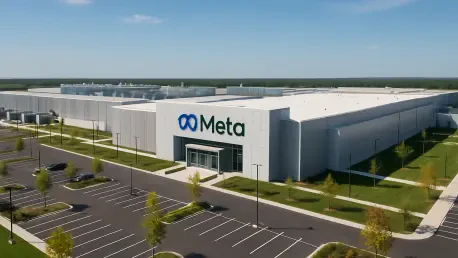In an era where digital infrastructure underpins nearly every aspect of modern life, the announcement of a massive investment by a tech giant in a small Midwestern town has sparked both excitement and curiosity among residents and industry watchers alike. With data centers becoming the backbone of everything from social media to artificial intelligence, Meta’s decision to allocate $1 billion for a sprawling new campus in Beaver Dam, Wisconsin, signals a significant step in expanding its global network. This 700,000-square-foot facility, set to be the company’s 30th data center worldwide and 26th in the United States, highlights the accelerating demand for robust data storage and processing capabilities. As the parent company of Facebook, Meta’s latest venture not only underscores its commitment to technological growth but also brings attention to the broader implications of such projects on local economies and environments. This development, slated for completion by 2027, offers a glimpse into the intricate balance of innovation, sustainability, and community impact.
Technological Advancements in Construction
Harnessing Cutting-Edge Tools for Efficiency
The construction of Meta’s new data center campus in Beaver Dam represents a showcase of modern building techniques designed to maximize precision and efficiency. Minneapolis-based Mortenson, the general contractor for this ambitious project, plans to integrate a suite of advanced technologies to streamline the process. Tools such as Building Information Modeling (BIM) coordination and live digital underground utility mapping ensure that every aspect of the build is meticulously planned and executed. Additionally, drone data capture and robotic automated layout systems promise to reduce human error while speeding up timelines. Virtual reality reviews, facilitated by Meta Quest devices, allow stakeholders to visualize progress in immersive detail. These innovations reflect a growing trend in the construction industry to adopt high-tech solutions for complex projects like data centers, where accuracy and speed are paramount to meeting tight deadlines and stringent operational requirements.
Setting Industry Standards with Innovation
Beyond the immediate benefits to the Beaver Dam project, the adoption of such sophisticated tools by Mortenson signals a shift in how the construction sector approaches large-scale infrastructure. The use of technology not only enhances on-site efficiency but also serves as a blueprint for future data center developments across the globe. By leveraging real-time data and automation, contractors can anticipate challenges before they arise, minimizing costly delays and ensuring safety. This forward-thinking approach is particularly critical in an industry where data center construction continues to outpace other nonresidential sectors, with surveys showing a significant portion of contractors already engaged in similar high-demand projects. Meta’s partnership with Mortenson on this initiative highlights how technological integration can redefine industry standards, pushing competitors to adapt or risk falling behind in a rapidly evolving market. The ripple effect of these advancements could reshape expectations for efficiency and precision in construction for years to come.
Economic and Environmental Impacts
Driving Economic Growth Through Infrastructure
Meta’s $1 billion investment in the Beaver Dam data center campus extends far beyond the facility itself, creating a substantial economic boost for the region. Nearly $200 million of the budget is earmarked for energy infrastructure upgrades, including network enhancements and utility substations to support the campus’s operations. This ancillary spending underscores a broader trend in the industry where data center projects catalyze growth in related sectors like power generation and transmission. Large contractors have noted that such developments often lead to increased demand for supporting infrastructure, generating opportunities for local businesses and workers. The robust growth in this niche, as evidenced by industry insights showing stronger project pipelines for firms with data center contracts, points to sustained economic vitality. For Beaver Dam, this influx of investment promises job creation and long-term financial benefits, positioning the town as a hub of technological progress.
Balancing Sustainability with Community Concerns
While the economic advantages are clear, the environmental implications of Meta’s data center project have sparked significant local debate, particularly around water usage. Data centers nationwide face scrutiny for their resource demands, and Beaver Dam is no exception, with residents voicing concerns about potential impacts on local water supplies. In response, Meta has committed to sustainability by implementing dry-cooling systems that eliminate water needs for cooling once the facility is operational. The company also plans to restore 100% of water consumed during construction to local watersheds and rehabilitate 570 acres of surrounding wetlands and prairie. Despite these efforts, tensions persist, mirroring broader national discussions in states facing similar challenges with AI-driven data center expansions. This situation highlights the delicate balance between technological advancement and ecological responsibility, a recurring theme as digital infrastructure continues to expand.
Navigating the Future of Responsible Development
The dual narrative of economic promise and environmental caution encapsulates the broader challenges facing the data center industry today. Meta’s initiatives in Beaver Dam reflect a cautious optimism, aiming to mitigate ecological concerns through innovative design and restoration projects. However, the lingering apprehensions among local communities underscore the need for transparent dialogue and collaborative solutions to ensure that technological growth does not come at the expense of natural resources. Industry trends suggest that as digital needs escalate, the demand for such facilities will only intensify, making it imperative to refine strategies that align progress with sustainability. The Beaver Dam project serves as a critical case study, offering lessons on how companies can address community concerns while driving economic development. Moving forward, striking this balance will be essential to maintaining public trust and ensuring the long-term viability of data center expansions across diverse regions.









